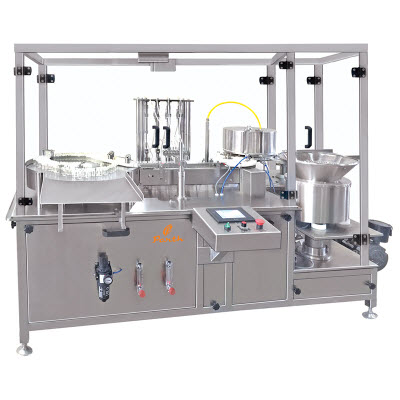For Export Enquiry
Call Us
Injectable Vial Filling Machines for Enhancing Pharmaceutical Production
Introduction
Injectable medications play a critical role in healthcare, providing essential treatments for a wide range of conditions, from infections to chronic diseases. The production of these medications demands utmost precision and sterility to ensure patient safety and therapeutic efficacy. Injectable vial filling machines are at the forefront of this manufacturing process, offering advanced technology to maintain the highest standards of drug purity and accuracy.
These machines automate the filling of vials with injectable drugs, significantly reducing the risk of contamination and ensuring consistent dosage delivery. As the demand for injectable medications continues to rise, the role of these machines in pharmaceutical production becomes increasingly vital.
Key Features of Injectable Vial Filling Machines
Injectable vial filling machines are designed with high-precision technology to ensure exact dosage measurement, which is crucial for the efficacy and safety of injectable drugs. They employ advanced sterilization processes such as steam, dry heat, or chemical methods to maintain the sterility of the vials and the product.
Automation is a key feature, enhancing the efficiency of the filling process by minimizing human intervention and thereby reducing the potential for contamination. These machines are versatile, capable of handling various vial sizes and types, from small-volume vials used in vaccines to larger ones for biologics. The integration of cleanroom environments ensures that the filling process meets stringent sterility requirements.
Technological Advancements
Recent advancements in filling technologies have revolutionized injectable vial filling machines, making them more accurate and reliable. Modern machines utilize peristaltic pumps and time-pressure filling systems that provide precise control over the filling volume, ensuring uniformity across all vials.
The integration of robotics and artificial intelligence further enhances precision, reducing the margin for human error and increasing the overall efficiency of the production line. These machines are also designed to seamlessly integrate with cleanroom environments, maintaining aseptic conditions throughout the filling process.
This technological evolution supports the production of high-quality injectable medications, meeting the rigorous demands of the pharmaceutical industry.
Benefits to Pharmaceutical Manufacturers
Injectable vial filling machines offer numerous benefits to pharmaceutical manufacturers, primarily through increased production speed and efficiency. By automating the filling process, these machines significantly reduce the time required to fill vials, enabling manufacturers to meet high demand without compromising on quality.
The automation also minimizes the risk of contamination, ensuring the sterility of the product and enhancing patient safety. Additionally, these machines are flexible and can handle various drug formulations and packaging needs, making them suitable for a wide range of injectable products. The reduction in waste and improved resource utilization translate into cost savings, making these machines a cost-effective solution for pharmaceutical companies.

Regulatory Compliance and Quality Assurance
Compliance with international regulatory standards such as GMP, FDA, and EU regulations is paramount in the pharmaceutical industry, and injectable vial filling machines are designed to meet these stringent requirements. These machines incorporate various quality control measures, including in-process controls, leak detection, and particle inspection, to ensure the integrity and quality of the filled vials.
Comprehensive validation and documentation processes are also in place to verify that the machines operate within the required parameters and produce consistent results. This rigorous approach to quality assurance not only ensures regulatory compliance but also enhances the overall reliability and safety of the injectable medications produced.
Applications in the Pharmaceutical Industry
Injectable vial filling machines are essential in the production of a wide array of injectable products, including vaccines, biologics, and sterile injectables. Their role is particularly crucial in the fields of oncology, cardiology, and infectious diseases, where precise dosage and sterility are critical.
These machines are also invaluable in the production of clinical trial materials and small-batch production for personalized medicine, where flexibility and precision are required. By enabling efficient and accurate filling of vials, these machines support the development and delivery of vital treatments, contributing to the advancement of healthcare and patient outcomes globally.
Challenges and Solutions
Despite their numerous advantages, injectable vial filling machines face challenges such as vial breakage and drug wastage. To address these issues, manufacturers have developed solutions like using breakage-resistant materials and implementing precise filling mechanisms that minimize wastage. Regular maintenance and calibration of the machines are essential to ensure consistent performance and prevent downtime.
Handling potent and hazardous drugs safely is another challenge, which is mitigated by using closed systems and protective barriers to safeguard operators and maintain product integrity. These solutions enhance the reliability and efficiency of injectable vial filling machines, ensuring they meet the high demands of pharmaceutical production.
Future Trends
The future of injectable vial filling machines looks promising, with several trends poised to enhance their capabilities further. Single-use systems are gaining popularity for their ability to enhance sterility and reduce cross-contamination, offering a more flexible and cost-effective solution for small-batch production.
The integration of IoT and data analytics allows for real-time monitoring and optimization of the filling process, improving efficiency and reducing the risk of errors. Advances in lyophilization, or freeze-drying, are also being integrated with vial filling machines, enabling the production of stable, long-lasting injectable products. These trends highlight the continuous innovation in this field, ensuring that injectable vial filling machines remain at the cutting edge of pharmaceutical manufacturing.
Conclusion
Injectable vial filling machines are indispensable in modern pharmaceutical production, ensuring the accurate and sterile filling of vials with injectable medications. Their advanced technology, coupled with rigorous regulatory compliance and quality assurance measures, supports the production of high-quality, safe, and effective injectable drugs.
As technological advancements continue to emerge, these machines will play an even more critical role in meeting the growing demands of the healthcare industry. By choosing the right injectable vial filling machine, pharmaceutical manufacturers can enhance their production capabilities, ensure patient safety, and contribute to the advancement of medical treatments worldwide.
We provide 24 x 7 Customer
Service & Support
Copyright © 2025, Parth Engineering & Consultant ( India ).
Web Design by Opal Infotech





